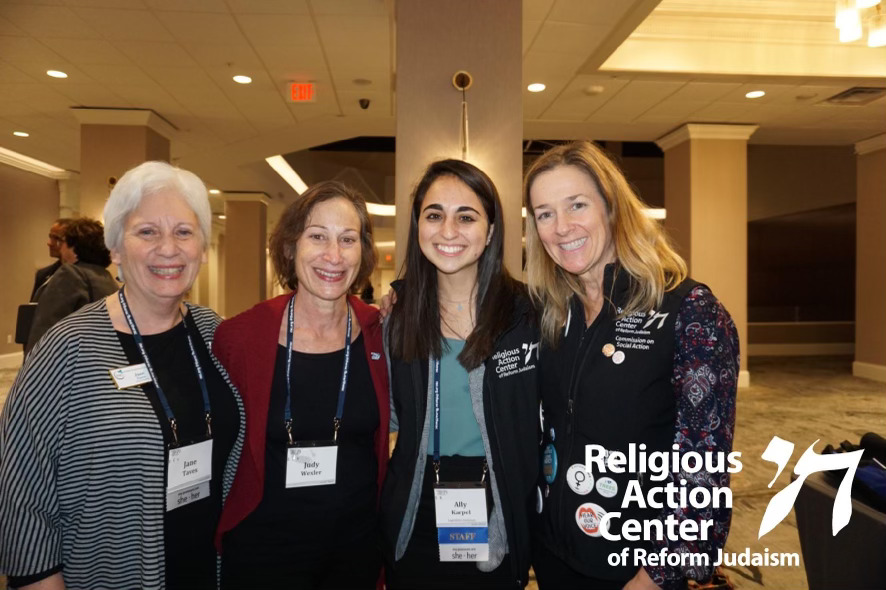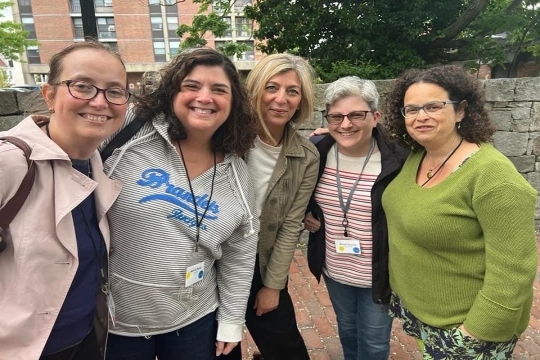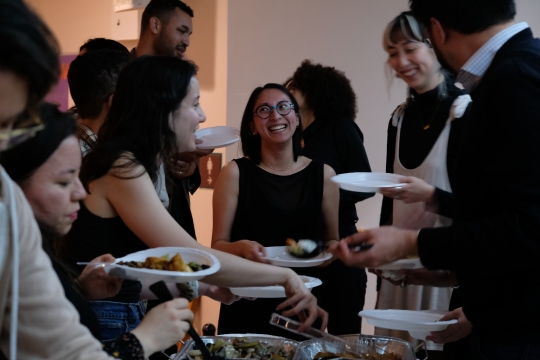
My relationship with WRJ began with a business card. It was June 2018, and the URJ Board of Trustees was convening in Austin, TX, for their annual Board meeting. As a recent graduate and former student leader at the University of Texas Hillel, I was asked to lead Shabbat morning services for the URJ Board before joining Board members for lunch and a discussion on how to best engage college students in the Reform Movement.
When introducing me, the Hillel Director mentioned that I would be moving to Washington D.C. later that summer to begin work as a Legislative Assistant at the Religious Action Center of Reform Judaism (RAC)–an announcement that was met with a round of applause and an abundance of smiles from the crowd.
After t’filah, I was approached by a woman who enthusiastically handed me her business card and explained that she was on the Executive Committee of Women of Reform Judaism. She shared: “Each year, WRJ has a designated RAC LA, funded by WRJ’s YES Fund, who works on WRJ’s priority issues and represents us in coalitions and on Capitol Hill. It would be so wonderful if you were our WRJ LA.”
I took the woman’s business card, careful not to make any promises I wouldn’t be able to keep. While I would be thrilled to be assigned a portfolio with WRJ’s priority issues–namely reproductive rights, gender-based violence, pay equity, and other women’s rights-related issues, I was not sure if I would be able to have my first choice when it became time to pick policy portfolios.
I didn’t know it at the time, but the woman with the business card turned out to be Jane Taves, the then-WRJ Vice President of Advocacy and Marketing & Communications and now WRJ's Vice President of Engagement.
Luckily, I was able to procure my first choice in portfolios later that summer, and I became the 2018-2019 WRJ LA. Jane quickly became my “partner-in-crime” in all things WRJ advocacy related for the remainder of the year.
During my year as the WRJ Eisendrath Legislative Assistant, I had so many incredible opportunities that are not afforded to most 22-year-old, fresh-out-of-college adults. I represented WRJ and the RAC in Reform Pay Equity Initiative meetings; led high school students, college students, and older adults alike in a postcarding campaign to push back against the Trump Administration’s attempts to roll back Title IX protections for student survivors of sexual harassment and assault; led lobbying efforts to reauthorize the Violence Against Women Act and Supplemental Nutrition Assistance Program (SNAP), and was invited to speak at several District Conventions on a range of social justice topics.
A highlight of my tenure as the WRJ Legislative Assistant was helping to plan the inaugural WRJ Social Justice Conference (SJC) in May 2019, an event that culminated in the launching of the WRJ-RAC Reproductive Health & Rights Campaign, which I was also fortunate to lead (with Jane’s help) from 2019-2021. SJC was a moment when I was able to tangibly see much of the work we had been doing over the course of the year come to fruition. I spoke on a few different panels, taught workshops, and deepened relationships with WRJ women from across North America. The weekend was especially meaningful because my mom flew to DC to witness me “in action” at SJC. Since then, my mom has attended several WRJ events in her own community.
Most WRJ LAs only get one year with WRJ. I feel fortunate that I had three! During my second year at the RAC, I ran the WRJ-RAC Reproductive Health & Rights Campaign full time. This meant that while I got to lead WRJ’s advocacy efforts around reproductive rights—organizing members to submit written testimony against abortion bans in their state legislatures, coordinating educational workshops and panels, and mobilizing WRJ members to attend rallies and protests—another RAC LA was funded by the YES Fund to work on WRJ’s other priority issues.
In my third year at the RAC, I had the unique opportunity to serve as WRJ LA once again, from 2020-2021. During this time, I continued my work on the Reproductive Health & Rights Campaign while also working with WRJ leaders to draft and pass a resolution, “Addressing a Legacy of Reproductive & Gender-Based Violence Against Black, Indigenous, and Women of Color in North America,” which covered issues ranging from maternal health, forced and coerced sterilization, and violence against Indigenous women at the 2021 WRJ Board Meeting.
Today, I am getting ready to begin my second year of rabbinical school at Hebrew Union College-Jewish Institute of Religion. My desire to be a rabbi is directly related to the incredible opportunities I had during my time as a WRJ Legislative Assistant, and I am immensely grateful to the YES Fund and YES Fund supporters for making a position like WRJ Legislative Assistant possible.
Related Posts

“How good it is — when sisters dwell together!”

LUNAR: Simply Remarkable - An Ongoing WRJ YES Fund Partnership
75d5.jpg)

